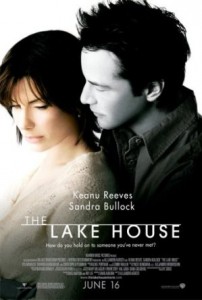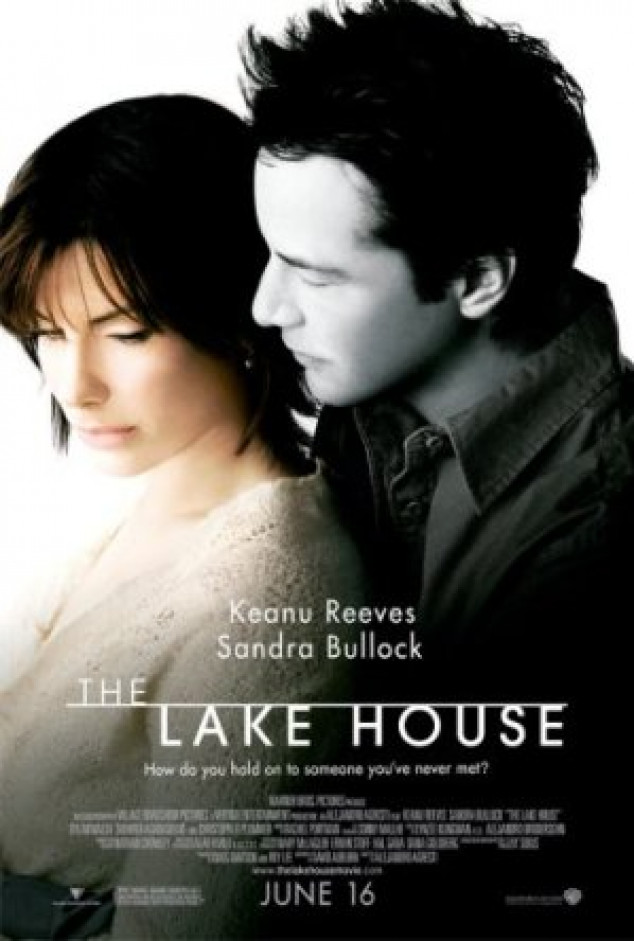Andy Hofmann Reviews “The Lake House”
Imagine: It’s 2006.

First off, I’m so sorry. Seriously, 2000-2009 was honestly just pretty horrible all the time. It’s like, it was 1999, and then Y2K happened, and instead of destroying humanity, it ended up ruining every film, book, and piece of music for the next ten years.
So, you’re in the thick of that. You’ve suffered through the Matrix sequels, the travesty that was Men in Black II, and a slew of other terrible films made worse by an adherence of the soulless plasticization of the 90’s aesthetic that marked the style of the early 2000’s.
So let’s say you encounter The Lake House. Based on a Korean film with a similar premise and plot (viz. Il Mare) and released June 16, the Sci-Fi-influenced film stars Keanu Reeves and Sandra Bullock as the leads in a Romantic Drama about time travel, fate, and loneliness. Directed by Alejandro Agresti and distributed by Warner Brothers, the film grossed $114,830,111 over its initial release at the box office. Running at 105 minutes, it–
Wait a second. A Romantic Drama? Starring Keanu Reeves? And Sandra Bullock? As the romantic leads. They, like, kiss and everything? What is this, Speed? And was there something in there about… time travel? Whaaaaaaat?
Oh, God. I really am sorry.
The plot is basically this: Keanu Reeves is an architect in 2004, living in and repairing the titular Lake House, which he recently bought for unknown reasons. Sandra Bullock lives in 2006 as a doctor, having recently moved out of said House in order to pursue her career. Both of them have their insecurities, problems, neuroses, etc., etc.
The action of the film begins when they discover their mutual residence’s mailbox can send letters through time, and, instead of using this fact to try and improve the universe, they, in typical hollywood fashion, they use it to start a hackneyed romance. This is particularly horrible upon realising Katrina happened in 2005–Sandra Bullock does nothing to warn Keanu of the impending disaster. They don’t even try to use it to make money off of stocks or something.
Anyway, their romance blossoms and stuff, but now, for the question I’m here to ask: is it any good? I hope my opinion is already clear.
First: who decided to cast post-Matrix Keanu reeves into a romantic film? Everyone knows the muscles in his face were injected with concrete after 1999. Seriously, the guy’s pretty emotionless looking/sounding/feeling throughout the entire film. It’s sort of pitiful. Sandra Bullock’s story is more convincingly acted, however, and when her character’s emotions dealt with the impending dread of fate, I actually felt something, rather than having Keanu break my suspension of disbelief every other minute.
To be honest, though, for about 90% of the film, I managed to think it was a pretty decent movie. There were some irking details but, overall, the way the film was going, I thought I might’ve been able to decently like it. The mysterious nature of the mailbox, the pain and loneliness that comes with a long distance relationship, discussions of fate, family, love, death, and architecture that give insights into failed dreams, lives, and relationships–it could’ve been a decent film about the human condition in a modern world, trying to escape and deal with our pasts.
And then: the last 10%. It ruined the film in almost every way:
So, at the beginning of the film, Sandra Bullock is eating lunch, talking with her mother, when suddenly, a car runs into an unnamed and unseen pedestrian, who she tries to save (being a Doctor), but ultimately fails. This detail is part of what causes her to return to the lake house and ultimately find Keanu’s letters by chance. Now, if you know anything about plot it is strikingly obvious that the pedestrian who died was Keanu Reeves, which sets up a nice dramatic irony for the rest of the film. Sad moments are sadder, happy moments are bittersweet, and discussions of fate are made more poignant and thoughtful. This could have been an okay film, especially when Bullock obviously cites said dead pedestrian as a reason for her (stereotypical) end-of-second-act dumping of Keanu.
Soon after this, the film starts being unable to handle its own chronology. It does the thing where time fast-forwards a bit for both characters, establishing Reeves leaving The Lake House and (indirectly) giving it to Sandra, while in 2006 she tries to move on and continues to be dissatisfied with her life. 2004 becomes 2005 which becomes 2006 while 2006 becomes 2007 and 2008.
The film failed in handling this sequence of events. Splicing the fast-forwarding of two timelines together, especially when the timelines are a) only two years apart, b) directly related to each other and c) within the same continuity and largely containing the same characters (a lot of the time you aren’t sure if a scene is following “future” Sandra or “past” Sandra) means that a lot of the time, you don’t actually have a clue when anything actually is, resulting in an unfortunate disorientation that unfortunately continues until almost the very end of the film.
The Plot finally comes full circle in 2006/2008, when Bullock (finally) figures out that the man she failed to save two years ago was, in fact, Keanu Reeves–the day exactly two years after he died. Upon realizing this, Sandra, in a mad frenzy, drives back to The Lake House and tries to warn Keanu of his impending, untimely doom. Keanu, meanwhile, is shown rushing to the plaza where 2006-Sandra is eating lunch upon his realizing that that day was the anniversary of the beginning of their relationship, hoping he still might have a chance. It’s all sort of tragic and beautiful in a fulfillment-of-dramatic-irony sort of way.
Or, it would be, if Keanu actually died at the end of the film.
Ah, and there’s the rub: Sandra’s letter actually succeeds! Her warning reaches Keanu, and, instead of experiencing death-by-car, he waits another two years, until he can appear before the teary-eyed Bullock and have sloppy end-of-romcom makeouts with her in a ridiculous auburn turtleneck.
And that is a horrible crime against everything the film had built up until that point. Keanu Reeves should have died. Not only does this forcing of a happy ending subvert the mood and tone of the rest of the film, where, through irony, the hopelessness of fate and dreams and love made the story feel real, but it opens several gigantic plot holes and, ultimately, turns the entire film nonsensical. If Keanu’s death is what caused Sandra to return to the Lake House and begin their time-spanning romance, how would she even know who Keanu Reeves is and want to have sloppy makeouts with him? Further, if Keanu doesn’t die, how would have Bullock been able to know about his untimely demise and warn him about his death that isn’t happening? It’s a time paradox; if you go back in time and kill your grandfather before he has children, how would you be able to go back and time and kill your grandfather?
Now, plot holes, so long as they make a story more powerful and effecting, don’t bother me all that much. But, when a plot hole obliterates the power of an artistic piece, that is a travesty. Furthermore, this plot hole absolutely wrecks the plot, which is a gigantic no-no, especially in a time travel film.
Further, this communicated to me everything wrong with Hollywood’s preconceptions of what filmmaking is– a tacked on, unsatisfyingly happy ending, one designed to try and appeal to the most people possible, ruining what could have been a beautiful exploration of fate and love in a bid to make sales. Yes, the Korean movie that The Lake House was based on ended happily, but it ended without plot holes and an intact plot– the male lead is saved, but at the cost of both leads’ memories of each other. That makes sense. That has the abillity to be a beautiful ending.
What makes me even angrier is that this sort of Hollywood-schlock bid for sales worked. Il Mare, the original film, bombed at the Korean box office, while The Lake House earned more than both films’ budgets combined. This sort of thing is entirely unacceptable. The Lake House isn’t a good film. It should not have done well at the box office. This is only encouraging the trite filmmaking that an art form controlled by media giants creates.
There are other minor quibbles– like how, in a movie about time travelling letters, Keanu manages to be interrupted by a character two years in the future– but these would have been forgivable if not for The Lake House’s trainwreck of an ending. Ultimately, the lake house left that worst taste in my mouth, the same taste I came away with after watching Men in Black II or the Matrix Sequels–one of disappointment, of wishing for what could have been.







Bahaha…now if the Lake House was a tesseract and Keanu fell through the window that would’ve made a great movie.